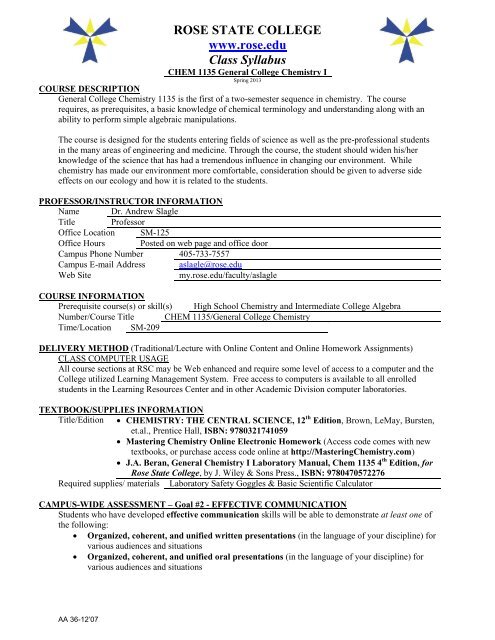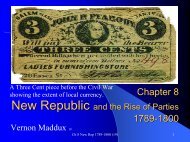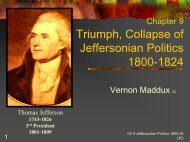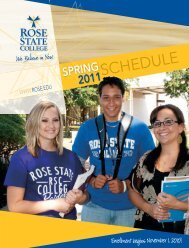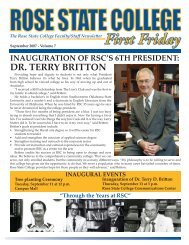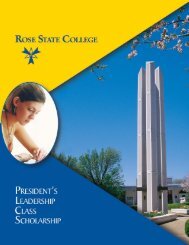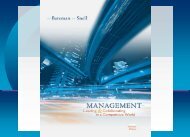Class Syllabus - Rose State College
Class Syllabus - Rose State College
Class Syllabus - Rose State College
Create successful ePaper yourself
Turn your PDF publications into a flip-book with our unique Google optimized e-Paper software.
ROSE STATE COLLEGE<br />
www.rose.edu<br />
<strong>Class</strong> <strong>Syllabus</strong><br />
CHEM 1135 General <strong>College</strong> Chemistry I<br />
Spring 2013<br />
COURSE DESCRIPTION<br />
General <strong>College</strong> Chemistry 1135 is the first of a two-semester sequence in chemistry. The course<br />
requires, as prerequisites, a basic knowledge of chemical terminology and understanding along with an<br />
ability to perform simple algebraic manipulations.<br />
The course is designed for the students entering fields of science as well as the pre-professional students<br />
in the many areas of engineering and medicine. Through the course, the student should widen his/her<br />
knowledge of the science that has had a tremendous influence in changing our environment. While<br />
chemistry has made our environment more comfortable, consideration should be given to adverse side<br />
effects on our ecology and how it is related to the students.<br />
PROFESSOR/INSTRUCTOR INFORMATION<br />
Name Dr. Andrew Slagle<br />
Title Professor<br />
Office Location SM-125<br />
Office Hours Posted on web page and office door<br />
Campus Phone Number 405-733-7557<br />
Campus E-mail Address aslagle@rose.edu<br />
Web Site<br />
my.rose.edu/faculty/aslagle<br />
COURSE INFORMATION<br />
Prerequisite course(s) or skill(s) High School Chemistry and Intermediate <strong>College</strong> Algebra<br />
Number/Course Title CHEM 1135/General <strong>College</strong> Chemistry<br />
Time/Location SM-209<br />
DELIVERY METHOD (Traditional/Lecture with Online Content and Online Homework Assignments)<br />
CLASS COMPUTER USAGE<br />
All course sections at RSC may be Web enhanced and require some level of access to a computer and the<br />
<strong>College</strong> utilized Learning Management System. Free access to computers is available to all enrolled<br />
students in the Learning Resources Center and in other Academic Division computer laboratories.<br />
TEXTBOOK/SUPPLIES INFORMATION<br />
Title/Edition<br />
CHEMISTRY: THE CENTRAL SCIENCE, 12 th Edition, Brown, LeMay, Bursten,<br />
et.al., Prentice Hall, ISBN: 9780321741059<br />
Mastering Chemistry Online Electronic Homework (Access code comes with new<br />
textbooks, or purchase access code online at http://MasteringChemistry.com)<br />
J.A. Beran, General Chemistry I Laboratory Manual, Chem 1135 4 th Edition, for<br />
<strong>Rose</strong> <strong>State</strong> <strong>College</strong>, by J. Wiley & Sons Press., ISBN: 9780470572276<br />
Required supplies/ materials Laboratory Safety Goggles & Basic Scientific Calculator<br />
CAMPUS-WIDE ASSESSMENT – Goal #2 - EFFECTIVE COMMUNICATION<br />
Students who have developed effective communication skills will be able to demonstrate at least one of<br />
the following:<br />
Organized, coherent, and unified written presentations (in the language of your discipline) for<br />
various audiences and situations<br />
Organized, coherent, and unified oral presentations (in the language of your discipline) for<br />
various audiences and situations<br />
AA 36-12’07
COURSE OBJECTIVES/EXPECTED OUTCOMES<br />
Upon successful completion of the course the student should be able to:<br />
1. Define and identify chemical terminology.<br />
2. Recall symbols and chemical formulas.<br />
3. Recognize and comprehend chemical theories and models as pertaining to:<br />
a) the atom<br />
b) formulas, equations, and mass balance<br />
c) types of bonding in molecules<br />
d) molecular geometry<br />
e) matter as solids, liquids, and gases<br />
f) transitions between phases<br />
g) solutions and colligative properties<br />
4. Analyze and apply theories and models along with their relationships to solve problems.<br />
5. Acquire fundamental laboratory techniques.<br />
GRADING SCALE<br />
Overall Letter Grades will be assigned based on percentage of total class points as follows:<br />
A<br />
B<br />
C<br />
D<br />
F<br />
90%<br />
80-90%<br />
70-80%<br />
60-70%<br />
COURSE POLICIES<br />
STUDENT RESPONSIBILITIES<br />
Exams:<br />
Quizzes:<br />
Homework:<br />
Attendance:<br />
Cell Phones:<br />
Computers:<br />
Exams will be given during regular class time, except the last exam, which will be given during<br />
the Final Exam time scheduled in the Course Catalog. Exam dates will be announced in class<br />
at least one week prior. There are no makeup exams unless arranged prior to the scheduled<br />
exam.<br />
<strong>Class</strong> quizzes will end 10 minutes after the start of class. Do not be late because there is no<br />
makeup quiz. Most quizzes will be announced the class period before. Some will be pop<br />
quizzes over material from previous class notes.<br />
Textbook Homework: Problems from the end of the chapter in the textbook are highly<br />
recommended, but hard-copy solutions will not be taken up for credit. Problems from the<br />
textbook will frequently be used for quizzes, as exam questions, and examples during<br />
recitation, and also are used for Mastering Chemistry Homework.<br />
Attendance is required by school policy. There will be no makeup exams, quizzes, or labs. If<br />
you must miss an exam, quiz or lab, contact your instructor as far in advance as possible to<br />
discuss possible alternatives.<br />
Please turn the things off before class.<br />
No computers allowed during class.<br />
Electronic Communication<br />
o Electronic communication is the official means for communication to the students of<br />
<strong>Rose</strong> <strong>State</strong> <strong>College</strong>. The <strong>College</strong> will send communications to students via e-mail and<br />
will expect that those communications are received and read in a timely manner.<br />
o Thus, all <strong>Rose</strong> <strong>State</strong> <strong>College</strong> students are issued a student e-mail account. The <strong>College</strong><br />
will direct all electronic communications to the college-issued e-mail address. Students<br />
should monitor the college assigned student e-mail account on a frequent and consistent<br />
basis in order to remain informed.<br />
RECOMMENDED STUDY METHOD(S)<br />
The best way to be successful in this course will be to solve the example exercises as you read through the<br />
chapter, and solve problems at the end of each chapter. When you are truly comfortable with your ability<br />
to solve those problems you should also be comfortable solving similar problems on exams or quizzes.<br />
INSTITUTIONAL GRADING POLICIES<br />
Ex.: Withdrawal, Incomplete Grade, Audit, etc. (See <strong>College</strong> Catalog)<br />
STUDENT SUPPORT SERVICES<br />
<strong>Rose</strong> <strong>State</strong> <strong>College</strong> complies with Section 504 of the Rehabilitation Act and The Americans with<br />
Disabilities Amendment Act (ADAAA). Students with disabilities who seek accommodations must make<br />
their request by contacting the Office of Disabilities Services, located in LRC 125 or call 733-7407. The<br />
student will be asked to provide documentation concerning the disability. All accommodations must be<br />
approved by the Office of Disability Services.<br />
AA 36-12’07
STUDENT POLICIES<br />
Academic Integrity<br />
<strong>Rose</strong> <strong>State</strong> <strong>College</strong> expects students to understand and to follow basic standards of honesty and integrity.<br />
Some common violations of these basic standards of academic integrity include but are not limited to,<br />
plagiarism, cheating on tests and examinations, presenting work completed for one course as original<br />
work for another, and other forms of dishonest performance on college assignments, as explained below.<br />
Plagiarism means the use of the thoughts, ideas, words, phrases or research of another person or source as<br />
one's own without explicit and accurate credit to the original author.<br />
Cheating on examinations of any kind (quizzes, midterms, finals, etc.) includes copying another student's<br />
answers, exchanging information, using notes or books unless expressly permitted to do so by the<br />
instructor, or gaining access to examinations prior to the actual taking of such examinations.<br />
Other examples of academic dishonesty include, but are not limited to, copying or preparing another<br />
person's work; or buying prepared papers.<br />
Assisting anyone to engage in any of the violations described above qualifies as academic dishonesty.<br />
All rules and standards of academic integrity apply equally to all electronic media, particularly all intranet<br />
and internet activities. This is especially true for any form of plagiarism, ranging from submission as<br />
one's own all or part of a paper obtained from an internet source to failure to cite properly an internet<br />
source.<br />
TENTATIVE CLASS CALENDAR/Course Outline<br />
No dates have been set for exams but they will be announced at least a week ahead of time.<br />
AA 36-12’07


